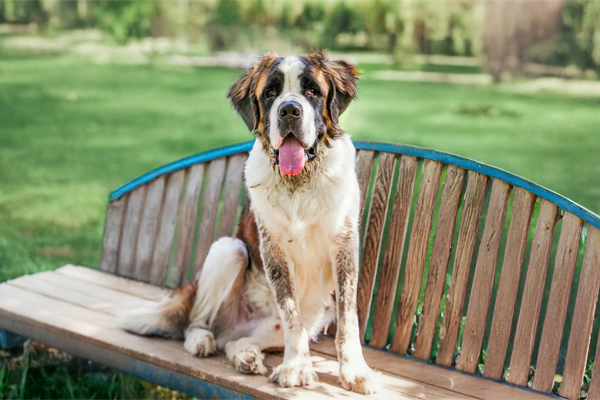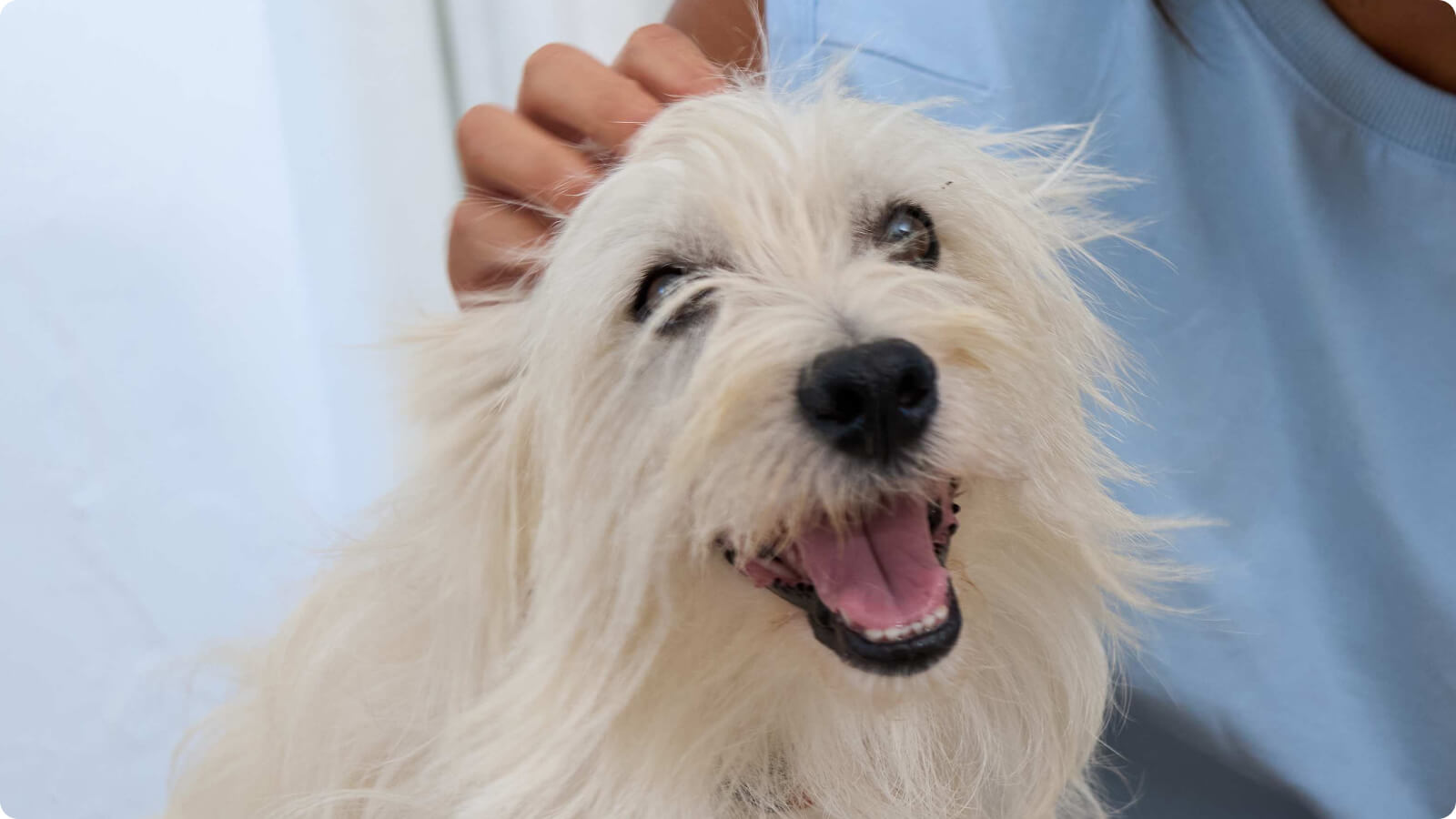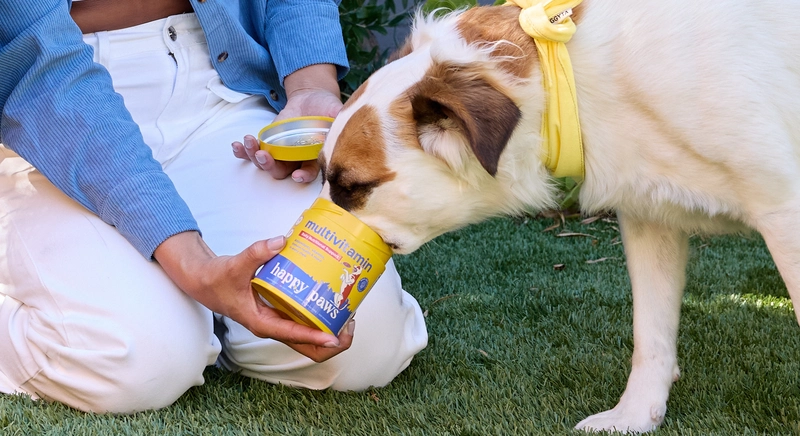The Massive Fur Baby
Large, lovable, and some say lazy, the Saint Bernard (also called St. Bernard) is a massive furball that gingerly nestles into families of all sizes. These dogs, with their burly, thick coats and droopy faces, have become a staple “family dog” breed. First bred as working dogs, Saint Bernards used their pillowy coat and unbelievable determination to withstand harsh winters in the Swiss Alps, rescuing lost travelers along the Saint Bernard Pass—a snowy traverse that led to Rome.
Nowadays, St. Bernards are one of the most beloved breeds, particularly for their gentle disposition, unyielding patience, and gargantuan size. (You won’t truly appreciate their size until they’re fully spread on top of you; they get up to 180 pounds!) They easily fill the role of family companion and quickly earn an irreplaceable spot on your family’s couch—one that they won’t relinquish quietly.
At Happy Paws, we’re dedicated to helping all dogs, from purebreds to certified mutts, live their happiest, healthiest lives. We’ve designed our dog supplements to target a range of trouble spots in your dog’s health—many of which include common issues for a Saint Bernard.
In this article, we’ll dive into the history of the gentle giant named Beethoven, give you some information and tips on how to care for them, and help you decide which supplements are best for your massive furball, the Saint Bernard.
Quick Facts
Origin: Switzerland
Size: Extra large
Breed Group: Working
Lifespan: 8–10 years
Coat: Long hair—weekly grooming recommended
Temperament: Affectionate, easy-going, mild-mannered & keen
Exercise Needs: All dogs need some form of daily exercise. St. Bernards prefer more saunters, less sprints. More lounging, less lunges. These dogs don’t gravitate toward high-impact, heavy-panting exercises. They’d rather take a leisurely stroll through the yard or accompany you on a short walk. Plus, with their large coats, it’s best to keep your St. Bernard indoors during warm months.
Training: The Saint Bernard stems from a variety of European working dogs; they are well-equipped to follow detailed instructions. Saint Bernards have a high canine IQ and a deep determination to please. So, they dive fur-first into obedience and behavior training. Like all dogs, training is best introduced during the puppy stage. This is especially true for Saint Bernards. Training will help St. Bernard puppies acclimate to their massive size.
Dog Health: Saint Bernards are considered among the few extra-large dog breeds. These curious little pups can reach up to 180 pounds in just under two years. So, as with all extra-large dogs, Saint Bernards face a few unique health challenges. Common problems this breed faces include hip dysplasia, digestive problems, cardiovascular issues, and urinary tract stones. We’ll discuss how to address each below.
Happy Paws for Saint Bernards
Enrich your dog’s health with high-quality, tasty supplements like these!
| Type of Happy Paws Supplement | Best for … |
| Digestive Health Dog Chews | Supporting healthy digestion and a strong gut flora. |
| Skin & Coat Dog Chews | Strengthening your dog’s coat & dermal health. |
| 10-in-1 Multivitamin Dog Chews | Giving your pupper a daily dose of essential vitamins, minerals & other nutrients. |
| Bladder Health Dog Chews | Relieve symptoms of poor bladder health, like incontinence, frequent urination, and more. |
| Hip & Joint Dog Chews | Soothing common symptoms of joint dysplasia & inflammation. |
In-Depth Look at Popular Supplements
If you’re lucky to have a St. Bernard to call family, we’d like to welcome you to the club! This gentle, warm-hearted breed seems to spill love, affection, and patience wherever it goes (and drool; they are big droolers). Return the love and spoil your pet St. Bernard daily with healthy treats that actually taste like treats.
Our high-quality, tail-waggin’ dog supplements use an array of all-natural, organic ingredients to enrich your Saint Bernard’s health, while satisfying their taste buds. Here are a few dog supplements to help you care for your pupper.
Digestive Health Dog Chews: Our Digestive Health Dog Chews use powerful, all-natural probiotics and enzymes to enrich your dog’s gut health and strengthen their digestive system. These healthy, tasty dog treats offer a delicious pumpkin flavor that spoils your pet dog’s palate while fortifying their gut flora.
Skin & Coat Dog Chews: Perhaps the most iconic feature of a Saint Bernard is their lustrous coat (second is their dangling tongue). Our Skin & Coat Dog Chews help keep the sheen in your dog’s glow. These vegan, chicken-flavored soft chews use a blend of skin-supporting ingredients, like biotin and coconut oil, to restore dermal health and replenish your dog’s coat.
10-in-1 Multivitamin Dog Chews: Our 10-in-1 Multivitamin Dog Chews use multiple essential nutrients to sharpen your dog’s daily health and give them a well-rounded supplement. One vegan, lamb-flavored dog treat introduces ten key nutrients to keep your dog healthy, happy, and active.
Bladder Health Dog Chews: Our Bladder Health Dog Chews contain powerful antioxidants, such as cranberries and Kona berries, to calm common urinary issues, like incontinence, frequent urination, and urinary tract infections (UTIs).
Hip & Joint Dog Chews: Soothe the symptoms of joint dysplasia with our Hip & Joint Dog Chews! Packed with a blend of joint-friendly ingredients, this dog supplement helps reduce inflammation and support joint health, thanks to compounds like glucosamine, chondroitin, and hyaluronic acid.
Common St. Bernard Health Concerns
Like other giant dog breeds, St. Bernards are often prone to common health issues like these:
Elbow & Hip Dysplasia: According to the American Kennel Club (AKC), many medium-sized to extra-large dog breeds are susceptible to elbow and hip dysplasia. This issue arises from birth when the bone in a joint is misshapen, causing an awkward fit in your dog’s joints. This defect can often lead to joint pain, osteoarthritis, limping, and trouble standing up.
Digestive Issues: Large to giant breeds commonly have digestive problems, like bloating. These issues can stem from their diet, lifestyle, or genetics.
Cardiovascular Disease: St. Bernards are genetically predisposed to cardiovascular problems. So, feeding them a vitamin-rich, nutrient-packed diet is essential to help fortify their heart health.
About Saint Bernards
Saint Bernards are fearless, gentle pups that originated from a small hospice tucked away in the Swiss Alps, the Great Saint Bernard Hospice. These dogs, with their winter coats and keen sense of direction, would protect visitors, guide travelers, and rescue drifters from treacherous snow slides and avalanches. Their even temperament and gentle disposition earned them the nickname “hospice dogs.” Today, St. Bernards are seen as the quintessential family dog, thanks to movies like Beethoven.
Their Temperament
Their size is the only intimidating aspect of a well-trained Saint Bernard. These dogs are slow-moving, gentle giants that do well around older children, guests, and other pets (yes, even cats). If you have younger children in the home, it’s best to supervise them and teach them about your St. Bernard’s boundaries. On any given day, if your St. Bernard isn’t roaming around your house or yard, they are no doubt settled in on the couch, watching the world pass by with a curious, Zen-like gaze (their tongue hanging out from their mouth, of course).
How to Care for a St. Bernard
If you’re thinking about adding a St. Bernard to your family, here are a few tips to help keep them happy, healthy, and lively, from their puppy years and well into their golden years.
Weekly Coat Maintenance
The Saint Bernard was raised in frigid temperatures, so their coat consists of dense layers that shed year-round. To keep their coat and skin healthy, it’s best to carve out time for weekly brushing and semi-weekly baths. These steps will help keep your Saint Bernard from smelling like their mountaineering ancestors.
Moderate Exercise
All dogs need some level of exercise. But Saint Bernards don’t need as much as most breeds. These are slow-moving dogs that would rather saunter than sprint. They can show bursts of rambunctious energy, but they follow those up with day-long naps. So, a leisurely 30-minute walk will do just fine to help your Saint Bernard meet their exercise needs. Plus, it will help them from overheating during the warm months.
Early Socialization
Well-trained St. Bernards get along great with friendly dogs, guests, and other pets. But they need to be properly socialized when they’re young. They’re incredibly friendly, so if you meet any strangers on the way, your Saint Bernard will make sure to leave a good impression—and a little bit of drool.
Happy Paws: High-Quality Dog Supplements
Keeping your dog happy, healthy, and active shouldn’t feel like a full-time job. At Happy Paws, we’ve designed our dog treats with the best ingredients and flavors possible (our dogs definitely approve!). We’ve made sure these treats are certified organic, non-GMO, and third-party tested for purity, letting you spoil your pup easily with healthy, tasty dog treats.
FAQ
Is a St. Bernard a good family dog?
Because of their gentle disposition and patient temperament, Saint Bernards can make a great family dog—with the proper training, of course. As puppies, these dogs grow big, and they grow fast, leading to a slightly awkward stage early in their lives; these young giants just don’t know how big they are. Without much effort, they can accidentally knock down a small child or an elderly friend or family member. So, it’s best to start obedience training when they’re young, just to teach your growing giant a little grace.
Will a Saint Bernard protect me?
Saint Bernards are gentle and friendly with just about anyone they meet, so they aren’t the best protector breed. If they see a threat, they may jump into action, but most attempt to scare intruders away with a deep, intimidating bark.
Does a St. Bernard dog bark a lot?
While all dogs vary in what makes them bark, Saint Bernards, typically, don’t bark. However, like a good watchdog, they may bark to alert you.
Are Saint Bernards lazy or active?
Saint Bernards aren’t the most active breed. They’d much rather prefer to find a comfortable place on your couch or porch to quietly observe the world around them.
Are St. Bernard dogs high maintenance?
Because of their large size and coat, Saint Bernards can be considered high maintenance for inexperienced pet parents.
How do you give Saint Bernards health supplements?
You can give your dog a Happy Paws health supplement in several ways. First, we’ve designed these supplements as dog treats, so you can give them to your pupper as a reward for good behavior. Or, you can add it to your dog’s kibble; they make a pretty tasty topper, too.





